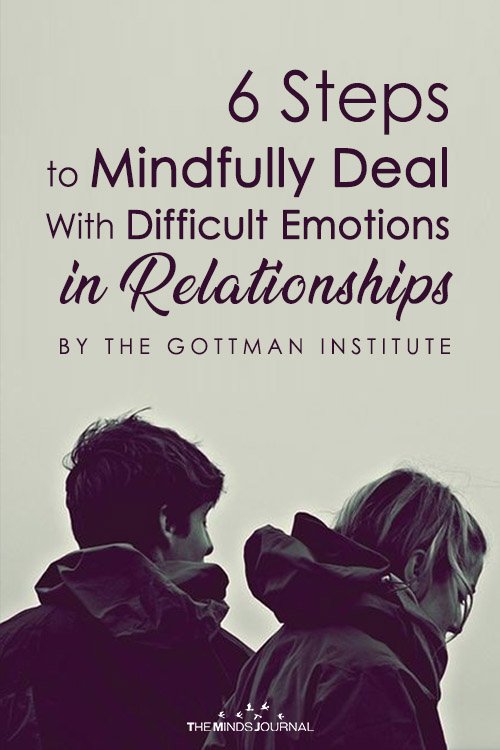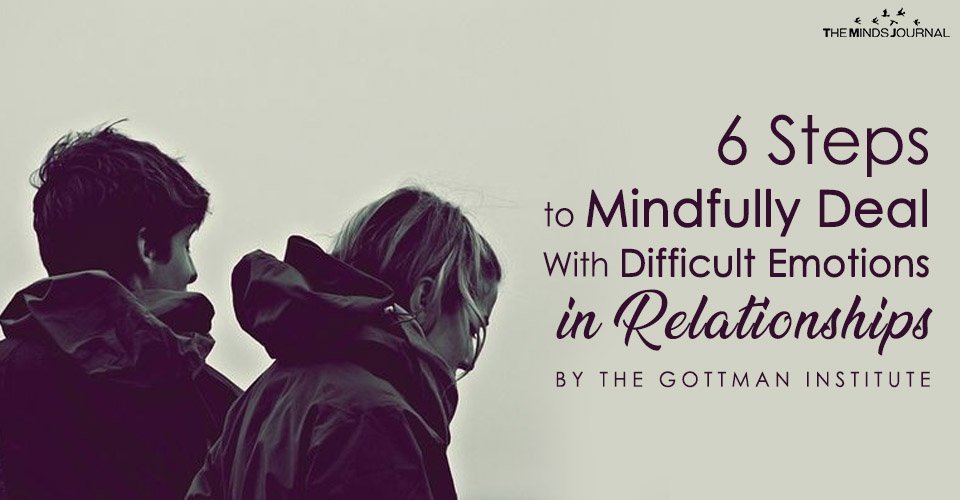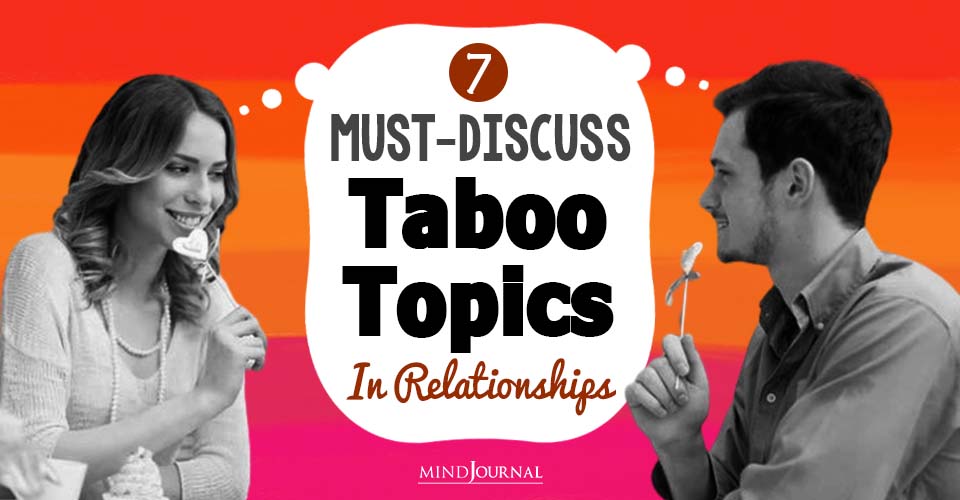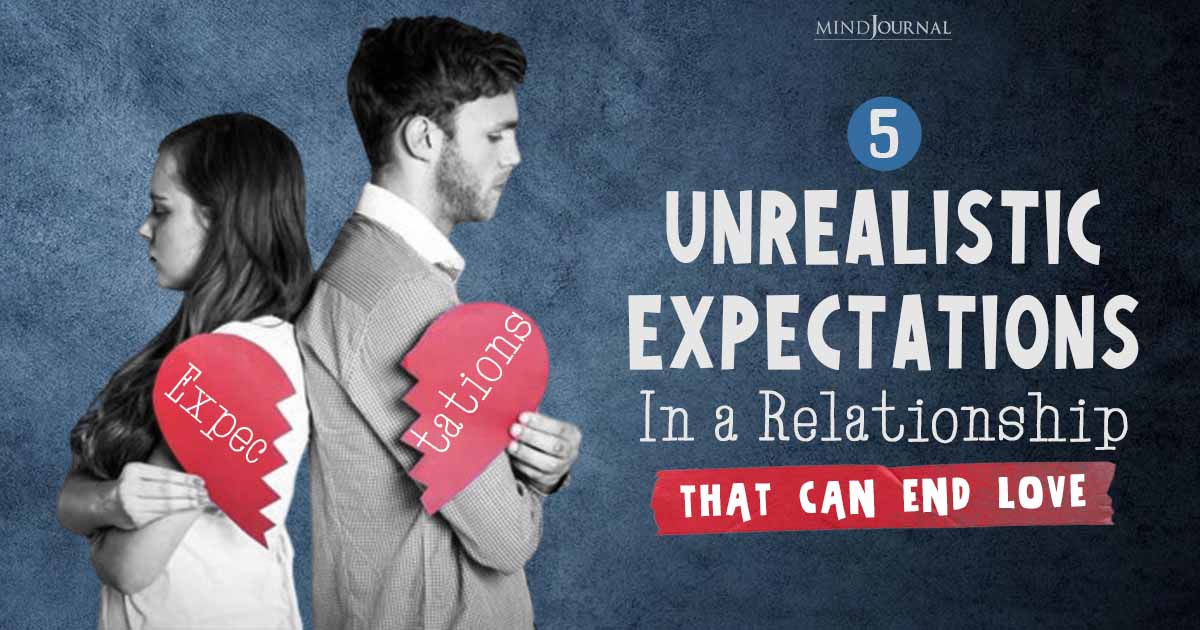Six easy steps to deal with Difficult Emotions in Relationships!
Let’s get real here.
For most of us – myself included – life is fast-paced and chock full of family, relationship, and work stressors.
This reality, along with the ever-increasing pressures of technology and society at large, can really take a toll on your marriage.
As a result, difficult emotions like anger, confusion, fear, loneliness, and sadness, just to name a few, can arise. Emotions like these are often the most present and powerful forces in your life.
The key to overcoming these difficult emotions is mindfulness! Practicing mindfulness enables you to calm down and soothe yourself. In this state, you have space to reflect and thoughtfully respond, rather than react.
Following these six steps will help you to understand and deal with your difficult emotions in a mindful way:
1. Turn toward your emotions with acceptance
Once you become aware of the emotion you are feeling, notice where it is in your body. You may feel it as a stomach ache, a tightening of your throat, the pounding of your heart, or tension somewhere.
Sit with this anger, anxiety, depression, grief, guilt, sadness, shame, or whatever emotion you are experiencing. Become aware of it and don’t ignore it. If this is difficult, get up and walk around or get a cup of tea.
The key here is to not push the emotion away. Bottling it up inside will only cause it to bubble up and explode later, resulting in more difficult emotions or even a complete emotional shutdown. Listen to your difficult emotions. They are trying to help you wake up to what is going on before a major crisis occurs.
2. Identify and label the emotion
Instead of saying, “I am angry”, say, “This is anger” or, “This is anxiety.” In this way, you’re acknowledging its presence, while simultaneously empowering you to remain detached from it.
When my husband was in the hospital before he passed, I felt a deep sense of uncertainty, anxiety, and fear.
I needed to acknowledge and identify the emotions and say to myself,
“I know that I am experiencing anxiety and fear right now and I don’t know what will happen, but I am going to just ‘be’ with it.”
Although it remained an extremely painful experience to the end, identifying and labeling my emotions in this way allowed me to take some of the pain out of what I was feeling.
This, in turn, allowed me to stay in the present, versus catapulting me into the future, or trapping me in the past. Being thrust in either direction would have only caused me to blame myself. I can just imagine how that critical voice would have rung out, “If only you would have done something different, maybe there would have been a different outcome.”
3. Accept your emotions
When you are feeling a certain emotion, don’t deny it. Acknowledge and accept that the emotion is present, whether it is anxiety, grief, sadness, or whatever you are experiencing in that moment. Through mindful acceptance, you can embrace difficult feelings with compassion, awareness, and understanding towards yourself and your partner.
Think of a friend or a loved one who might be having a hard time.
What would you say to them?
Bring the scenario of what you would say to them into your mind’s eye.
Now, say the same thing to yourself: “I am ok. I am not to blame. I did the best I could.”
Hold these images and phrases within yourself with loving kindness and compassion. Extend this act of kindness toward yourself and become aware of what is going on within you. In this way, you will gain the power to not only calm and soothe yourself, but also your partner.
You will soon come to realize that you are not your anger, fear, grief, or any other difficult emotion you are feeling.
Instead, you will begin to experience these emotions in a more fleeting manner, like clouds that pass by in the sky. Opening yourself up to your emotions allows you to create a space of awareness, curiosity, and expansiveness that you can then apply to your relationship, as well as any other aspect of your life.
4. Realize the impermanence of your emotions
Every one of your emotions is impermanent. They arise and reside within you for a time, and then disappear. It’s easy to forget this when you’re in the midst of dealing with difficult emotions.
Allow yourself to witness and observe your emotions with kind attention and patience, giving them the latitude to morph, and in many cases, completely evaporate.
To embrace this process, ask yourself:
“What and where is this feeling? What do I need now?
How can I nurture it? What can I do for my partner?
What can my partner do for me? How can we, as a couple, turn toward one another with acts of loving-kindness?”
Asking these focused questions and responding, in turn, will go a long way to promote empathy, compassion, and connection within your relationship.
5. Inquire and investigate
After you have calmed and soothed yourself from the impact of your emotions, take a moment to delve deeply and explore what happened.
Ask yourself: “What triggered me?
What is causing me to feel this way? What is the discomfort I’m experiencing and where is it arising?
Was it as result of my critical mind, or was it in reaction to something my partner said or did?”
Perhaps you had a hard day at work or difficulty dealing with your family. Maybe you feel unappreciated, lonely, or disconnected as a result of your interactions with someone.
Whatever the cause or trigger, look at it closely and ask yourself, “What is happening here?”
Consider what was said or done and compare it to your values.
What were your expectations surrounding the situation?
What reactions or judgments caused you to become angry or anxious? Is this a pattern that keeps arising?
Asking yourself these critical questions and investigating the root of your difficult emotions will help you gain empathy and insight into what you are experiencing.
Taking yourself off autopilot and trusting your deepest, authentic self to answer these questions about your situation will create a space to see things with a different perspective. This will ultimately allow both you and your partner to be more present and connected with each other.
6. Let go of the need to control your emotions
The key to mindfully dealing with your difficult emotions is to let go of your need to control them. Instead, be open to the outcome and what unfolds.
Step outside of yourself and really listen to what your partner is feeling and what he or she has to say. Only then will you truly gain an in-depth understanding of your emotions and the interactions surrounding them within your relationship.
Mindfully dealing with emotions is hard and it takes time. Be kind, compassionate, and patient with yourself and your partner. You’re in this together!
As Dr. John Gottman has said, “In a good relationship people get angry, but in a very different way. The Marriage Masters see a problem a bit like a soccer ball. They kick it around. It’s ‘our’ problem.”
We are fortunate that we live in a world where you and your partner can take the time to explore, discuss, and learn about mindfulness and your emotions. Take nothing for granted, for life is fragile and fleeting!
Try out these six strategies to deal with your difficult emotions that are troubling you in the relationships!
You may also like:
- Why Is It That Broken Men Expect Women To Manage Their Emotions For Them
- 6 Things That Love Isn’t and 5 Things Love Is
- Ways How Self-Esteem Makes Or Breaks Relationships
- 8 Things You MUST Know To Understand Your Partner’s Depression
- 6 Ways To Increase Emotional Intimacy In Your Significant Relationships.








